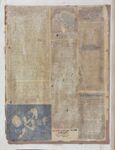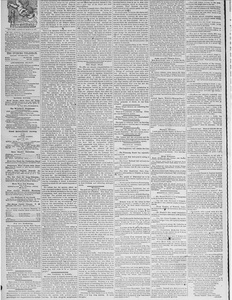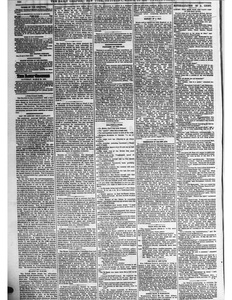< Spiritualism in Foreign Countries (continued from page 7-09) >
physical phenomena. M. Godin, who was a member of the National Assembly from 1871 to 1875, gives an account of seven pages in length of his experiences with Dr. Slade in Brussels. Colonel Devoluet, of Paris, continues his monthly narratives, now amounting to nine in number, of manifestations occurring through the mediumship of a girl named Amelie. The seances have been always confined to the family circle of Colonel Devoluet, and a gradual development of the medium’s powers has taken place, from raps and the transport of objects, especially flowers, through closed doors, to a highly-developed clairvoyant vision, by means of which many tests of identity, considered perfectly satisfactory by the sitters, have been given. The most remarkable phenomenon of a physical nature is that related by M. Greslez, of Setif, Algiers. This gentleman, having felt for some time the disadvantage of pursuing Spiritualism solely by means of writing mediumship, suggested to his spirit-friends to attempt a musical manifestation. He was directed to find two physical mediums, and to place one before the keyboard of the organ and the other at the bellows. The medium’s hands were to be over the keys, although she did not know how to use them. There first came a rolling sound from within the organ, then notes were struck, often quite distant from the hands of the medium, who was so overcome at the event that she began weeping, believing herself bewitched, In course of time, it appeared as if various musical spirits were operating, and when these retired quite inferior compositions were sometimes played. The seances took place by daylight, and strangers were occasionally invited to attend, with various results. On one occasion the organ-blowing medium fell asleep; there was no movement of the bellows, and yet the music proceeded, although no sound could be produced when contact with the keys was tried by persons in the circle. The Revue Spirite also gives some space to the question with which we have been occupied in England, that of Theosophy. It apologises to Colonel Olcott for its former cavalier treatment of elementals and elementaries, and proceeds to give its best attention to these important beings. A paper by Mr. Christian Reimers, on his experiments with paraffin moulds, adds another chapter to the accounts of physical phenomena, which form a new and important feature in the French view of Spiritualism.
The Messager de Liege and the Moniteur de la Federation Beige continue to appear fortnightly. They contain principally news of Dr. Slade’s sojournings in the German capitals, and a due amount of communications d’outre tombe, with dissertations on God and Creation from the pen of M. Tournier.
An important announcement comes from Mr. Z. J. Pierart who edited the Revue Spiritualiste from the year 1858 to the year 1869, the work of which he virtually continued in the Concile de la Libre Pensee. Three years ago this was suppressed by the French Government; and the first proofs of another work by Pierart were seized while passing through the post. All attempts to gain an explanation or to obtain redress were useless. M. Pierart then sent an account of these arbitrary proceedings on the part of the Government to the principal Republican journals. Not one inserted it. He has now resolved to bring out his journal under a new name, not calculated to excite suspicion. It is to be called pe Benedictin de Saint-Maur, and will be in the same form as the Revue Spiritualiste.
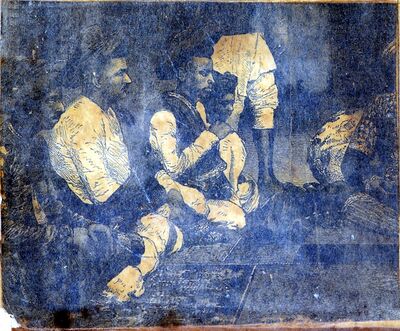
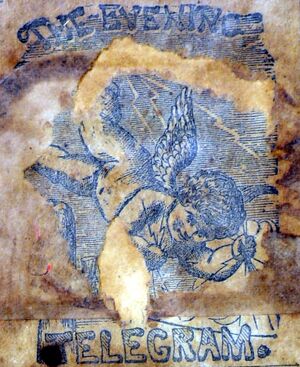
Old Shep's Ghost
We offer our sincere congratulations to Mme. Blavatsky and Colonel Olcott upon the enterprise and self-sacrifice they evinced a few evenings ago in exposing themselves to the cold of midnight to search for a legitimate ghost. It proves that the erudite author of “Isis” and the scarcely less erudite friend are deeply sincere in their belief in the existence of the supernatural and in the power of spirits to make themselves visible to mortal eyes. Nay, we will even go further and express our poignant regret that, after all, Old Shep’s ghost should turn out to be nothing more than a log a lantern. What we need in this age of the world is a genuine ghost can be either heard, seen and felt, or else can give some other indubitable evidence of its actuality. Mme. Blavatsky and Colonel Olcott made a mistake if they think that we have nothing but laughter and derision for the large number of excellent, if somewhat credulous, ladies and gentlemen whom they represent. We have nothing of the kind. On the contrary, we are willing that they should demonstrate what they believe to be true.
Now if the log and the lantern which did duty for Old Shep’s fhost had been non-existent, and if the mysterious light had continued to float at the foot of Thirty-fourth street forever, the Spiritualists would have had an argument upon their side. If every effort made by non-Spiritualists to explain the thing had failed, then the Spiritualists would have had at least some plausible reason for exultation. They would at any rate have had an explanation, which their antagonists were without, and this would have enabled them to take a long stride in advance of the position they at present occupy. But this is not the case. On the contrary, the Spiritualists have been routed and put to slaughter. The fraudulency of Old Shep’s ghost has inflicted upon them a wound from which they will not soon recover.
Apart from this we cannot avoid reflecting upon the unkindness of the wicked people who projected this heartless joke. It was particularly thoughtless to subject two of the principal lights of Spiritualism to the danger of catching cold, to say nothing of catarrh and inflammation of the lungs. While we reprobate the over credulity of these distinguished Spiritualists, we are not so unfeeling as not to sympathize with them in their fruitless and shivering midnight watch.
Exit the Ghost
...
Materialization of a Ghost
Several score of us, including divines, doctors and editors had watched far into the night for the appearance of the goblin candle on the East River. Mme. Blavatsky had given several impromptu lectures on spirits during the ravening. The Hierophant Coldcutt was also present, being ever persistently snubbed by Mme. Blavatsky.
“Ghost? Oh, yes!” said Mme. Blavatsky, letting the smoke curl up gracefully from her cigarette. “I can tell you all about them. This old man Shep is of the elementary order, Third Sphere, Second Division.”
“I don’t think he’s so far along as that,” said Hierophant Coldcutt, filling his piple.
“Nonsense, Hierophant,” said Blathersky in her brusque way. “You know nothing about it. A knowledge of the sort I imply here is possessed by none save such as have entered the Inner Circle of the Fourth Chapter of the Mysteries of Isis, and that, Hierophant, is further than you’ve gone or will go unless you pay up the regular fifteen cent dues of the Isosistorean Order.”
“You think, then, this is really a spirit carving its ghostly lantern to and fro across the river?” I asked.
“Think?” said Blathersky, scornfully. “No, I know it’s one. Pshaw! you every-day people are so blind. You’ve no idea of the world you live in or the one you don’t live in. Why, the air is full of spirits. <... continues on page 7-11 >
Editor's notes
- ↑ image by unknown author
- ↑ The Evening Telegram by unknown author. Title of The Evening Telegram
- ↑ Old Shep's Ghost by unknown author, Evening Telegram, The, vol. XI, No. 3916, March 23, 1878, p. 4
- ↑ Exit the Ghost by unknown author, Sun, The, Friday, March 22, 1878
- ↑ Materialization of a Ghost by unknown author, Daily Graphic, The, v. 16, No 1562, March 23, 1878, p. 154
Sources
-
Evening Telegram, v. 11, No. 3916, March 23, 1878, p. 4
-
Daily Graphic, v. 16, No 1562, March 23, 1878, p. 154
